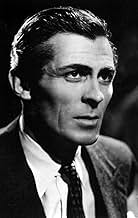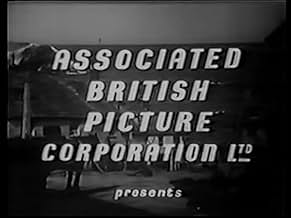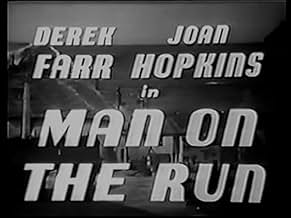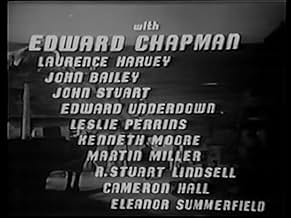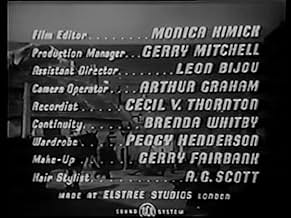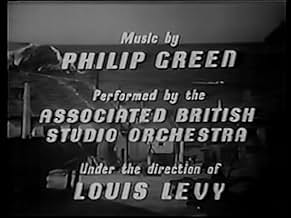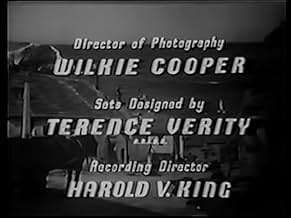NOTE IMDb
6,7/10
530
MA NOTE
Ajouter une intrigue dans votre langueIn post-war Britain, an army deserter unwittingly gets involved in murder and armed robbery and enlists the aid of a war widow to help clear his name.In post-war Britain, an army deserter unwittingly gets involved in murder and armed robbery and enlists the aid of a war widow to help clear his name.In post-war Britain, an army deserter unwittingly gets involved in murder and armed robbery and enlists the aid of a war widow to help clear his name.
- Réalisation
- Scénario
- Casting principal
Howard Marion-Crawford
- 1st Paratrooper
- (as Howard Marion Crawford)
Kenneth More
- Corporal Newman
- (as Kenneth Moore)
Martin Miller
- Cafe Proprietor
- (as Martyn Miller)
Avis à la une
Derek Farr deserted from the British Army after four years of service and went underground. Now he is at the end of his rope, so he takes his service revolver to a pawn shop.... to pawn it. While he's standing there, two other men enter, knock out the owner and flee, killing a bobby as they go. Now Farr is really being pursued and he randomly stops Joan Hopkins... who agrees to help him.
There are definite noir elements in this movie, with discussion the estimated 20,000 deserters and some grimy cinematography by DP Wilkie Cooper, but that's about the limits of it. Otherwise, writer-director Lawrence Huntington has turned out a reasonably taut man-accused movie. Despite a decent story, the movie itself is curiously inert, with a lot of talk and not much movement.
Farr is clearly not wearing his hairpiece for this movie, an odd choice for a romantic lead type, but that, I suppose, it part of the noir aspect of it. Watch out for Laurence Harvey in his second screen appearance, playing a detective. He's only mildly creepy in this one.
There are definite noir elements in this movie, with discussion the estimated 20,000 deserters and some grimy cinematography by DP Wilkie Cooper, but that's about the limits of it. Otherwise, writer-director Lawrence Huntington has turned out a reasonably taut man-accused movie. Despite a decent story, the movie itself is curiously inert, with a lot of talk and not much movement.
Farr is clearly not wearing his hairpiece for this movie, an odd choice for a romantic lead type, but that, I suppose, it part of the noir aspect of it. Watch out for Laurence Harvey in his second screen appearance, playing a detective. He's only mildly creepy in this one.
This is the one and only movie I saw (and I saw many) tackling the theme of deserters. Main character Peter is one of them, a guy who used to be a good soldier but felt compelled to run AWOL after four years of war because his father died in a raid and his mother and sister needed his presence.
Peter is working as a bartender in a remote corner of England when an ex-comrade happens to pass by and tries to blackmail him. Peter moves to London, where life is difficult and expensive, and while trying to pawn his weapon he gets involved in an attempted robbery. He's only a witness but the police are chasing him.
Attractive widow Jean comes to his help and the plot develops nicely, albeit in a slightly forced way towards a suitable ending. The interesting part is the perspective of deserters, considered both from a negative and less negative point of view and just for that, the movie deserves some extra points.
Peter is working as a bartender in a remote corner of England when an ex-comrade happens to pass by and tries to blackmail him. Peter moves to London, where life is difficult and expensive, and while trying to pawn his weapon he gets involved in an attempted robbery. He's only a witness but the police are chasing him.
Attractive widow Jean comes to his help and the plot develops nicely, albeit in a slightly forced way towards a suitable ending. The interesting part is the perspective of deserters, considered both from a negative and less negative point of view and just for that, the movie deserves some extra points.
"Man on the Run" is interesting for several reasons.
One is the postwar atmosphere in England and the problem they had with deserters, many of whom were on the run and resorting to crime. Here in the U. S., 21,000 people were charged and sentenced for desertion during World War II - 49 were sentenced to death, but only one sentence was carried out.
Although over 21,000 American soldiers were given varying sentences for desertion during World War II, including 49 death sentences, Slovik's death sentence was the only one that was carried out.
The main character in this is Peter Burden (Derek Farrar). After four years in the service, he needed extra time on his leave because his sister was dying. He was refused and stayed with her anyway.
Peter is in hiding when approached by someone who knew him, a Corp. Newman (Kenneth More, in a small part). Newman wants blackmail money; instead, Peter takes off.
When Peter tries to pawn his gun, the pawnshop is robbed at the same time by two men. The police think it's three. He is being chased through the streets when he runs into an apartment building. There he meets a widow, Jean Adams (Joan Hopkins) who agrees to help him. She hides him and lets him stay at her place.
Peter knows certain distinguishing features of one of the men and feels if he could just find him, the police would learn of his innocence. By a series of circumstances, the police zero in on Jean, so she and Peter take off to a friend's place out of London.
The chase continues, and it's Jean who actually sees someone in a cafe that she thinks is one of the robbers.
Too many coincidences in the story, but the actors are likeable, and you do pull for both of them.
Not only did More appear, but all during the film, I kept thinking one of the police detectives looked like Laurence Harvey. That's probably because it was Laurence Harvey.
One is the postwar atmosphere in England and the problem they had with deserters, many of whom were on the run and resorting to crime. Here in the U. S., 21,000 people were charged and sentenced for desertion during World War II - 49 were sentenced to death, but only one sentence was carried out.
Although over 21,000 American soldiers were given varying sentences for desertion during World War II, including 49 death sentences, Slovik's death sentence was the only one that was carried out.
The main character in this is Peter Burden (Derek Farrar). After four years in the service, he needed extra time on his leave because his sister was dying. He was refused and stayed with her anyway.
Peter is in hiding when approached by someone who knew him, a Corp. Newman (Kenneth More, in a small part). Newman wants blackmail money; instead, Peter takes off.
When Peter tries to pawn his gun, the pawnshop is robbed at the same time by two men. The police think it's three. He is being chased through the streets when he runs into an apartment building. There he meets a widow, Jean Adams (Joan Hopkins) who agrees to help him. She hides him and lets him stay at her place.
Peter knows certain distinguishing features of one of the men and feels if he could just find him, the police would learn of his innocence. By a series of circumstances, the police zero in on Jean, so she and Peter take off to a friend's place out of London.
The chase continues, and it's Jean who actually sees someone in a cafe that she thinks is one of the robbers.
Too many coincidences in the story, but the actors are likeable, and you do pull for both of them.
Not only did More appear, but all during the film, I kept thinking one of the police detectives looked like Laurence Harvey. That's probably because it was Laurence Harvey.
10clanciai
What you will remember of this film is the local atmosphere from the post war London with its rather weary aspect both in people and their minds and the shaggy streets, ultimately leading you down to old Wapping with one of the most genuine pub atmospheres found in any film, but there is a long way to go before that.
You will also remember the difficult case of 20,000 deserters after the war, many of them turning to criminality for having no other choice. That's the clinch in which our hero finds himself, when a burglary takes place the moment he is trying to pawn his old gun without bullets, the two robbers in desperation shooting both the clerk and, when on the run, a policeman fatally - the first casualty in the film. The clerk recovers and gives a description of our hero, whom he saw, while the two burglars were masked. So our hero finds himself wanted for murder. Could you get into any deeper sea of trouble?
It's also memorable for the fine performance by Joan Hopkins, who plays a widow who believes in our hero's innocence, Kenneth More has a small part in the beginning, which turns out fatal for our hero on a constant run, and Laurence Harvey is a policeman - neither is sympathetic. Derek Farr plays our hero convincingly enough, a completely ordinary man with an inordinate amount of bad luck, having lost practically all his family in the war. It's a sad story but well made, and the beautiful music adds some extra romantic and melancholy charm to it. In spite of the poor technical quality, I must give it almost a full score for its interesting story of an eloquent script, fluent tempo and excellent cinematography.
You will also remember the difficult case of 20,000 deserters after the war, many of them turning to criminality for having no other choice. That's the clinch in which our hero finds himself, when a burglary takes place the moment he is trying to pawn his old gun without bullets, the two robbers in desperation shooting both the clerk and, when on the run, a policeman fatally - the first casualty in the film. The clerk recovers and gives a description of our hero, whom he saw, while the two burglars were masked. So our hero finds himself wanted for murder. Could you get into any deeper sea of trouble?
It's also memorable for the fine performance by Joan Hopkins, who plays a widow who believes in our hero's innocence, Kenneth More has a small part in the beginning, which turns out fatal for our hero on a constant run, and Laurence Harvey is a policeman - neither is sympathetic. Derek Farr plays our hero convincingly enough, a completely ordinary man with an inordinate amount of bad luck, having lost practically all his family in the war. It's a sad story but well made, and the beautiful music adds some extra romantic and melancholy charm to it. In spite of the poor technical quality, I must give it almost a full score for its interesting story of an eloquent script, fluent tempo and excellent cinematography.
The great shame of unused female actors in British cinema is far too long; Joan Greenwood was an example, and rarely given roles that were truly worthy of her. Joan Hopkins is another and even less well known than Greenwood or many others. A pity because she had a statuesque beauty, and a quiet charm and in some shots her beauty almost rivals Greta Garbo. Opposite Derek Farr there is good chemistry, and for once she is pivotal to the film and not only decoration. Farr is a deserter from WW2 and on the run not only for that, but for a murder he is suspected of committing. Hopkins takes him into her flat and the two fall in love. I liked too the atmosphere of the UK after the war, with its turmoil at getting back to a previous life that will never come again. A fluctuating chaos that lasted through the late 1940's and the mid to late 1950's. The film is rich on detail, and there is Kenneth More as a war veteran in a small but significant role. Well directed,, and in the main well acted, it is worthy of hunting down for all those interested in this period of history, and the run down houses peeling with damp and cold bear no resemblance to the wealth there today. These films are essential to UK history and the passing of times, and the poverty and wealth that goes with it. And Joan Hopkins is quite simply excellent.
Le saviez-vous
- AnecdotesThe dialogue includes several clear uses of "basket" as a minced oath for "bastard". However the film was given an 'A' certificate (for "Adult Audiences") by the British Board of Film Censors, because of the depiction of an armed robbery.
- GaffesKenneth More is listed as Kenneth Moore in the opening credits but is listed correctly in the closing credits.
- Citations
Sgt. Peter Burden, alias Brown: Well, do you believe any of this, or am I just wasting my time?
Meilleurs choix
Connectez-vous pour évaluer et suivre la liste de favoris afin de recevoir des recommandations personnalisées
Détails
- Date de sortie
- Pays d’origine
- Langue
- Aussi connu sous le nom de
- Mann im Netz
- Lieux de tournage
- Société de production
- Voir plus de crédits d'entreprise sur IMDbPro
- Durée
- 1h 22min(82 min)
- Couleur
- Rapport de forme
- 1.37 : 1
Contribuer à cette page
Suggérer une modification ou ajouter du contenu manquant

